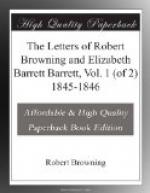I love your verses with all my heart, dear Miss Barrett,—and this is no off-hand complimentary letter that I shall write,—whatever else, no prompt matter-of-course recognition of your genius, and there a graceful and natural end of the thing. Since the day last week when I first read your poems, I quite laugh to remember how I have been turning and turning again in my mind what I should be able to tell you of their effect upon me, for in the first flush of delight I thought I would this once get out of my habit of purely passive enjoyment, when I do really enjoy, and thoroughly justify my admiration—perhaps even, as a loyal fellow-craftsman should, try and find fault and do you some little good to be proud of hereafter!—but nothing comes of it all—so into me has it gone, and part of me has it become, this great living poetry of yours, not a flower of which but took root and grew—Oh, how different that is from lying to be dried and pressed flat, and prized highly, and put in a book with a proper account at top and bottom, and shut up and put away ... and the book called a ‘Flora,’ besides! After all, I need not give up the thought of doing that, too, in time; because even now, talking with whoever is worthy, I can give a reason for my faith in one and another excellence, the fresh strange music, the affluent language, the exquisite pathos and true new brave thought; but in this addressing myself to you—your own self, and for the first time, my feeling rises altogether. I do, as I say, love these books with all my heart—and I love you too. Do you know I was once not very far from seeing—really seeing you? Mr. Kenyon said to me one morning ‘Would you like to see Miss Barrett?’ then he went to announce me,—then he returned ... you were too unwell, and now it is years ago, and I feel as at some untoward passage in my travels, as if I had been close, so close, to some world’s-wonder in chapel or crypt, only a screen to push and I might have entered, but there was some slight, so it now seems, slight and just sufficient bar to admission, and the half-opened door shut, and I went home my thousands of miles, and the sight was never to be?
Well, these Poems were to be, and this true thankful joy and pride with which I feel myself,
Yours ever faithfully,
RobertBrowning.
Miss Barrett,[1]
50 Wimpole St.
R. Browning.
[Footnote 1: With this and the following letter the addresses on the envelopes are given; for all subsequent letters the addresses are the same. The correspondence passed through the post.]
E.B.B. to R.B.
50 Wimpole Street: Jan. 11, 1845.
I thank you, dear Mr. Browning, from the bottom of my heart. You meant to give me pleasure by your letter—and even if the object had not been answered, I ought still to thank you. But it is thoroughly answered. Such a letter from such a hand! Sympathy is dear—very dear to me: but the sympathy of a poet, and of such a poet, is the quintessence of sympathy to me! Will you take back my gratitude for it?—agreeing, too, that of all the commerce done in the world, from Tyre to Carthage, the exchange of sympathy for gratitude is the most princely thing!




